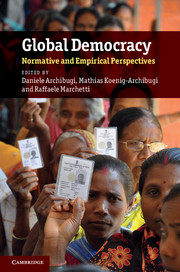Book contents
- Frontmatter
- Contents
- Figures
- Tables
- Notes on contributors
- Acknowledgements
- 1 Introduction
- 2 Models of global democracy
- 3 Citizens or stakeholders?
- 4 Is democratic legitimacy possible for international institutions?
- 5 Cosmopolitan democracy
- 6 Regional versus global democracy
- 7 Towards the metamorphosis of the United Nations
- 8 Flexible government for a globalized world
- 9 Global democracy and domestic analogies
- 10 Global democracy for a partially joined-up world
- 11 Civil society and global democracy
- 12 Global capitalism and global democracy
- 13 From peace between democracies to global democracy
- 14 The promise and perils of global democracy
- Index
- References
1 - Introduction
Mapping global democracy
Published online by Cambridge University Press: 05 June 2012
- Frontmatter
- Contents
- Figures
- Tables
- Notes on contributors
- Acknowledgements
- 1 Introduction
- 2 Models of global democracy
- 3 Citizens or stakeholders?
- 4 Is democratic legitimacy possible for international institutions?
- 5 Cosmopolitan democracy
- 6 Regional versus global democracy
- 7 Towards the metamorphosis of the United Nations
- 8 Flexible government for a globalized world
- 9 Global democracy and domestic analogies
- 10 Global democracy for a partially joined-up world
- 11 Civil society and global democracy
- 12 Global capitalism and global democracy
- 13 From peace between democracies to global democracy
- 14 The promise and perils of global democracy
- Index
- References
Summary
Until twenty years ago, very few international relations (IR) textbooks paid any attention to the problem of democracy across borders. If the word ‘democracy’ was mentioned at all (and sometimes it was not), it referred to how domestic regimes could affect national foreign policy behaviour, rather than the possibility of shaping global society or even international organizations (IOs) in accordance with the values and rules of democracy. When IR scholars started to be interested in the European Community, they usually saw it as a peculiar IO and neglected its embryonic democratic aspects. With rare exceptions, treatises on democratic theory mirrored this lack of interest and largely ignored the international dimensions of democracy. It is notable that even David Held, who played such a key role in placing the relationship between globalization and democracy on the intellectual agenda of the 1990s, had not yet addressed the issue in the first edition (1987) of his widely read Models of Democracy. In sum, the possibility of globalizing democracy was debated among people involved in political advocacy, such as the world federalists, but it attracted little scholarly attention.
Over the past twenty years, the intellectual landscape has changed considerably. Of course, many remain unconvinced that democracy can be applied beyond states, and regard the idea of a global democracy as an unachievable dream (Dahl 1999) or, worse, think that its advocates are barking to the moon (Dahrendorf 2001). But in spite of harsh dismissals by some authoritative democratic theorists, the issue can no longer be ignored. The seeds planted by scholars such as Richard Falk, David Held, Jürgen Habermas and Ulrich Beck have grown. Many recent handbooks in international relations and democratic theory discuss the issue of democracy beyond borders, and a new generation of scholars has developed the theme of democracy beyond borders in imaginative and sophisticated ways.
- Type
- Chapter
- Information
- Global DemocracyNormative and Empirical Perspectives, pp. 1 - 21Publisher: Cambridge University PressPrint publication year: 2011
References
- 2
- Cited by

